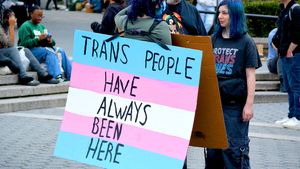The recent midterm elections have seen major milestones for representation in public offices. Florida saw the first Gen Z member elected to Congress; Maryland voters selected their first Black governor; and an unprecedented number of LGBTQ+ candidates won their races.
Another demographic that saw an increase in elected officials were Muslim Americans, who won their elections across the country in record-breaking numbers. Even in red states, Muslim candidates claimed several local, state, federal and judicial seats.
The Jetpac Resource Center and the Council on American-Islamic Relations (CAIR) recently found that 82 Muslim candidates were elected across 25 states, emerging victorious even in Texas, Virginia and Georgia. Their positions varied from local school boards to the United States House of Representatives.
Georgia currently has second-highest number of Muslim state legislators, and elected their first Muslim women to state Senate and House. Maine, Illinois, Ohio and Texas all also elected their first Muslim state legislators.
While CAIR only began tracking Muslim representatives in 2020, this year's elections still see a jump from previous seasons. Just two years ago, the record was set with 71 Muslim candidates elected.
\u201c2022 was a record-breaking year for Muslims running for state legislative seats:\n\n20 incumbents successfully ran for reelection\n\n2 appointed lawmakers ran for a full term & made history as the first Muslims elected to their respective state legislature\n\n17 new candidates won\u201d— Jetpac Resource Center (@Jetpac Resource Center) 1668182098
Executive Director of CAIR, Nihad Awad, told CBS News that this string of historic victories "is a testament to our community's ongoing rise in American politics and the trust our neighbors have place in us to represent them and fight for their interests."
"We are witnessing the next step in the American Muslim community's political transformation from marginalized voices that were sidelined, or worse, to decision makers," he said. "These newly-elected officials are building upon the success of our community's decades-long investment in civic engagement, voter registration and running for office."
Despite the uptick in representation, discrimination against Muslims has not subsided, particularly in hate crimes. According to FBI statistics, 13.2 percent of anti-religious hate crimes in 2019 targeted Muslim individuals. Crimes against Muslims increased staggeringly after 9/11, and have continued to rise even two decades later.
Despite this, Mohammed Missouri, Jetpac Resource Center Executive Director, believes the recent election results are something to take inspiration from.
"It shows that the Muslim community is building solid infrastructure for sustained electoral success," he said. "Policy decisions on education, housing, climate, and civil rights are shaped by state legislatures and it is critical that our voice is represented in the policymaking process."
- Pandemic 'Immunity Gap' Is Probably Behind Surge in RSV Cases ›
- A Timeline of LGBTQ+ Milestones in the US ›
- Muslim Women Athletes Condemn Hijab Bans, Fight For Inclusive Clothing in Sports - Advocate Channel ›



















































